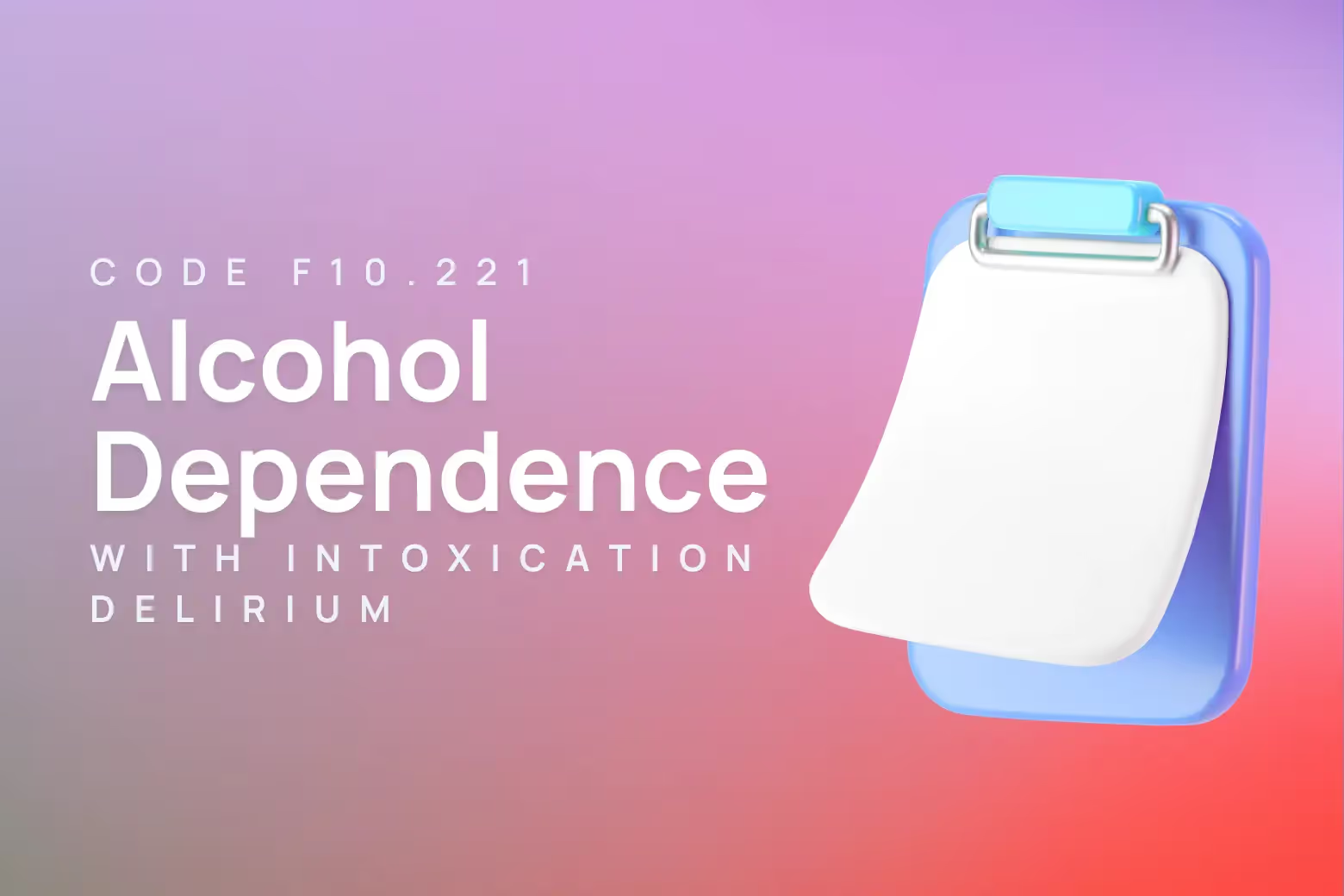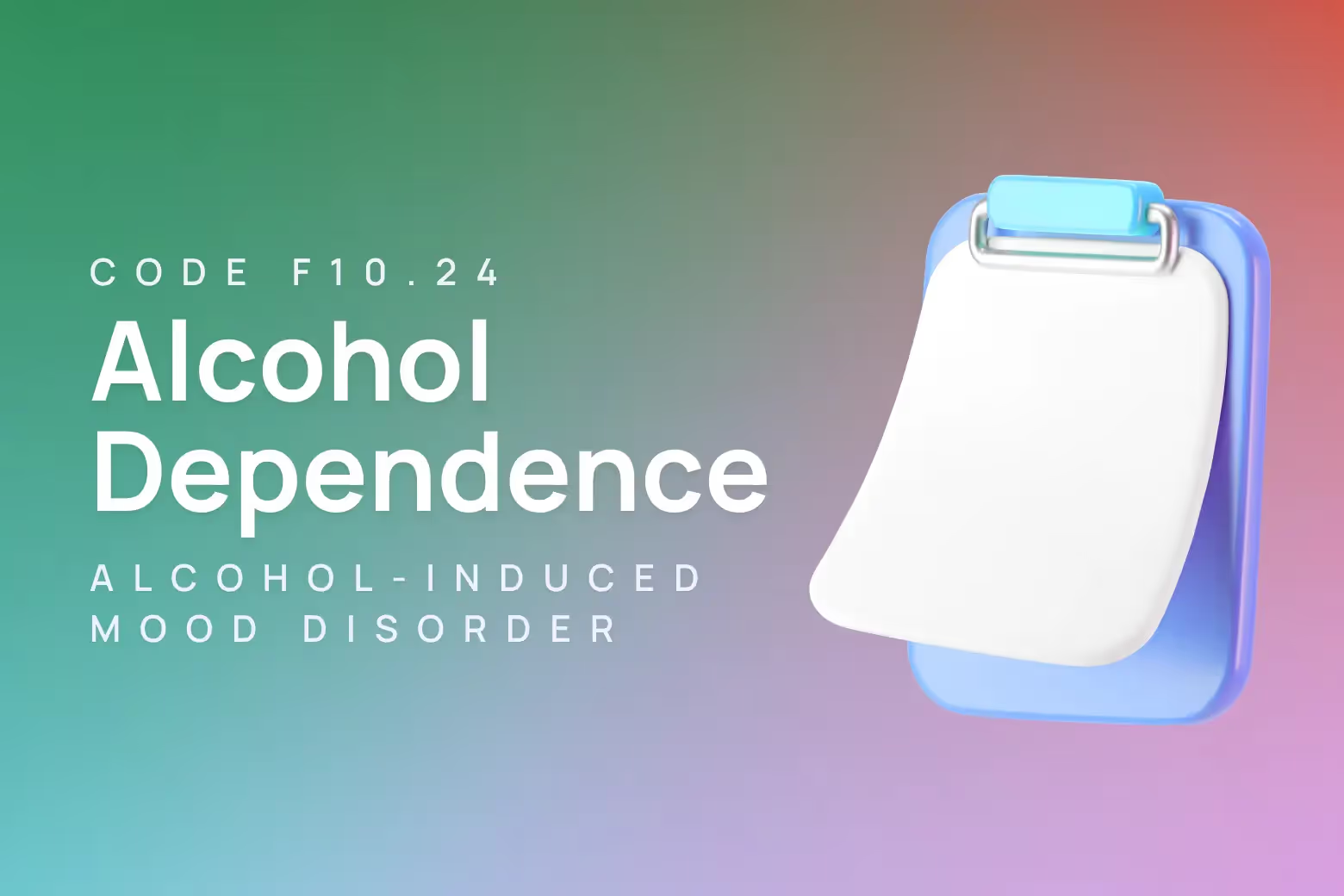ICD-10 code for alcohol dependence with other alcohol-induced disorder

F10.288 is the ICD-10 code for alcohol dependence with other alcohol-induced disorder.
This specific code identifies cases where moderate to severe alcohol use disorder exists alongside alcohol-induced psychiatric or medical conditions that don't fall into more specific categories like anxiety, sleep, or sexual dysfunction disorders.
Accurate diagnosis helps clinicians target both the underlying dependence and the secondary complications.
Key features:
- Requires evidence of alcohol dependence meeting 4+ DSM-5 criteria
- Includes co-occurring alcohol-induced disorders not otherwise specified
- Fourth character "8" indicates other specified alcohol-induced conditions
- Essential for comprehensive treatment planning addressing both dependence and induced disorders

Diagnostic criteria for alcohol dependence with other alcohol-induced disorder (F10.288)
Clinicians must establish two distinct but related components when using this code.
First, they need to document alcohol use disorder meeting criteria for moderate to severe dependence.
The core features of alcohol use disorder involve a pattern of problematic drinking that creates significant impairment. Individuals show persistent difficulties controlling their alcohol consumption despite experiencing negative consequences.
Primary diagnostic requirements include:
- Consuming alcohol in larger amounts or for longer periods than intended
- Persistent unsuccessful efforts to reduce or control alcohol use
- Significant time spent obtaining, using, or recovering from alcohol effects
- Strong cravings or urges to use alcohol
- Failure to fulfill major obligations at work, school, or home due to alcohol use
- Continued use despite persistent social or interpersonal problems
- Reduced important activities because of alcohol use
- Recurrent use in physically hazardous situations
- Continued use despite knowledge of persistent physical or psychological problems
- Evidence of tolerance requiring increased amounts for desired effects
- Withdrawal symptoms or using alcohol to avoid withdrawal
Additional alcohol-induced disorder criteria:
- Evidence of psychiatric or medical complications directly caused by alcohol use
- Symptoms develop during or within one month of alcohol intoxication or withdrawal
- Symptoms cause clinically significant distress or functional impairment
- Not better explained by a disorder that is not substance-induced
When to use F10.288 diagnosis code
Understanding differential diagnosis becomes crucial when multiple alcohol-related codes appear clinically appropriate.
The fourth character in F10 codes indicates the specific type of alcohol-induced disorder present.
Clinicians must distinguish between various alcohol-induced conditions to ensure accurate coding. The coding system requires careful attention to the specific type of secondary disorder documented.
F10.288 vs F10.280 (Alcohol dependence with alcohol-induced anxiety disorder)
Use F10.280 when clients present with prominent anxiety symptoms directly attributable to alcohol use. These might include panic attacks, generalized anxiety, or social anxiety that emerges during intoxication or withdrawal periods.
Choose F10.288 instead when alcohol-induced symptoms don't meet criteria for a specific anxiety disorder or when multiple types of alcohol-induced complications occur simultaneously.
F10.288 vs F10.281 (Alcohol dependence with alcohol-induced sexual dysfunction)
F10.281 applies specifically to cases where alcohol dependence causes erectile dysfunction, decreased libido, or other sexual performance issues. The sexual dysfunction must be a direct physiological consequence of chronic alcohol use.
F10.288 covers broader alcohol-induced complications including cognitive impairment, mood disturbances, or medical complications that don't fall into more specific categories.
F10.288 vs F10.282 (Alcohol dependence with alcohol-induced sleep disorder)
Select F10.282 when alcohol dependence directly causes insomnia, hypersomnia, or other sleep-wake disturbances. These sleep problems must be beyond typical hangover effects or acute withdrawal symptoms.
F10.288 encompasses other alcohol-induced disorders such as neurocognitive impairment, personality changes, or medical complications affecting multiple body systems.
Related ICD-10 codes
The F10.28 family of codes addresses alcohol dependence with various induced disorders:
- F10.28 - Alcohol dependence with other alcohol-induced disorders (unspecified)
- F10.280 - Alcohol dependence with alcohol-induced anxiety disorder
- F10.281 - Alcohol dependence with alcohol-induced sexual dysfunction
- F10.282 - Alcohol dependence with alcohol-induced sleep disorder
- F10.288 - Alcohol dependence with other alcohol-induced disorder
Additional related codes include F10.10 for mild alcohol use disorder, F10.20 for moderate to severe alcohol use disorder without induced complications, and F10.23x codes for alcohol dependence with withdrawal conditions.
Interventions and CPT codes for alcohol dependence with other alcohol-induced disorder
Evidence-based treatment approaches must address both the underlying alcohol dependence and the secondary induced disorders. Comprehensive care typically involves multiple therapeutic modalities working together.
Cognitive behavioral therapy approaches
Cognitive behavioral therapy serves as a first-line psychosocial intervention for alcohol dependence. CBT helps clients identify triggers for drinking while developing more effective coping strategies for managing both alcohol cravings and secondary symptoms.
Relevant CPT codes:
- 90791 - Psychiatric diagnostic evaluation for comprehensive assessment
- 90834 - Psychotherapy, 45 minutes (38-52 minutes) for individual CBT sessions
- 90837 - Psychotherapy, 60 minutes (53+ minutes) for intensive individual therapy
Motivational interviewing interventions
Motivational interviewing effectively addresses ambivalence about changing drinking behaviors while exploring personal motivation for recovery. This approach works particularly well as a prelude to more intensive interventions.
Relevant CPT codes:
- 99408 - Alcohol screening and brief intervention, 15-30 minutes
- 99409 - Alcohol screening and brief intervention, greater than 30 minutes
- 90832 - Psychotherapy, 30 minutes (16-37 minutes) for brief motivational sessions
Family and group therapy approaches
Family involvement helps address relationship dynamics that may contribute to continued alcohol use while building support systems for recovery. Group therapy provides peer support and shared learning experiences.
Relevant CPT codes:
- 90846 - Family psychotherapy without patient present
- 90847 - Family psychotherapy with patient present
- 90853 - Group psychotherapy for substance use disorder treatment
Medication-assisted treatment
Pharmacological interventions can reduce cravings and prevent relapse while addressing co-occurring symptoms. Medications may target both the alcohol dependence and induced complications.
Relevant CPT codes:
- 90791 - Initial psychiatric evaluation for medication assessment
- 99213-99215 - Office visits for medication management and monitoring
How Upheal improves F10.288 ICD-10 documentation
Suggesting appropriate ICD-10 codes based on session content
Upheal's clinical documentation platform analyzes session notes to identify key diagnostic indicators for alcohol dependence and secondary complications.
The platform recognizes patterns in client presentations that suggest alcohol-induced disorders beyond basic dependence.
When clinicians document symptoms of cognitive impairment, mood changes, or medical complications alongside alcohol use patterns, Upheal can suggest considering F10.288 rather than simpler alcohol use disorder codes. This helps ensure comprehensive diagnostic accuracy.
Maintaining HIPAA-compliant records with proper diagnostic coding
The platform automatically tracks diagnostic criteria documentation across multiple sessions.
This longitudinal tracking helps clinicians see patterns that support F10.288 diagnosis while maintaining secure, compliant record-keeping.
Upheal's built-in coding guidance helps prevent common documentation errors that might result in claim denials or compliance issues.
The platform ensures that all necessary diagnostic elements are captured for complex dual diagnoses.
Reducing administrative burden so you can focus on client care
Complex cases involving alcohol dependence with induced disorders require extensive documentation to support medical necessity.
Upheal automates much of this documentation process while preserving clinical accuracy.
The platform generates comprehensive progress notes that capture both substance use patterns and secondary complications.
This reduces time spent on paperwork while improving the quality of diagnostic documentation.
Supporting clients with alcohol dependence with other alcohol-induced disorder
Treatment planning for F10.288 cases requires careful coordination between interventions targeting alcohol dependence and those addressing induced complications.
Successful outcomes depend on treating both conditions simultaneously rather than sequentially.
Clinicians must regularly reassess symptoms to distinguish between alcohol-induced effects and potentially independent psychiatric conditions.
Many alcohol-induced symptoms resolve with sustained sobriety, while others may require ongoing intervention.
Family involvement often proves crucial for clients with complex alcohol-related presentations. Educating family members about both the addiction process and secondary complications helps build appropriate support systems while reducing enabling behaviors.
Upheal's clinical documentation platform helps behavioral healthcare providers spend more time with clients and less time on paperwork.
The platform generates accurate, compliant notes while tracking diagnostic criteria across sessions.
Try Upheal for free to see how intelligent documentation can improve your practice efficiency while maintaining the highest standards of clinical care.













